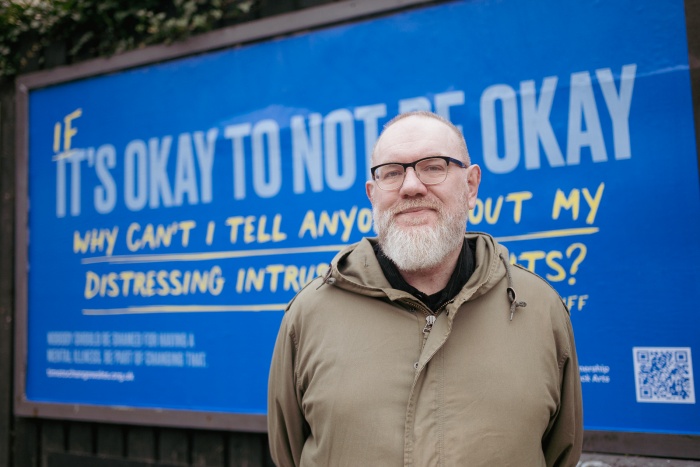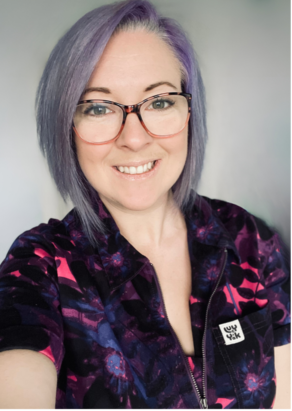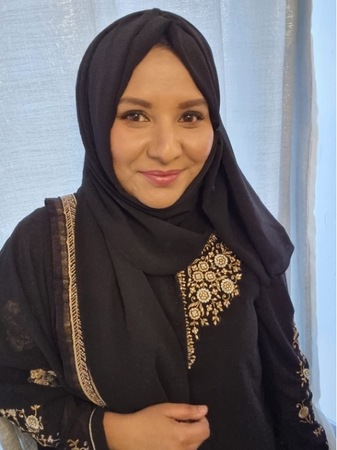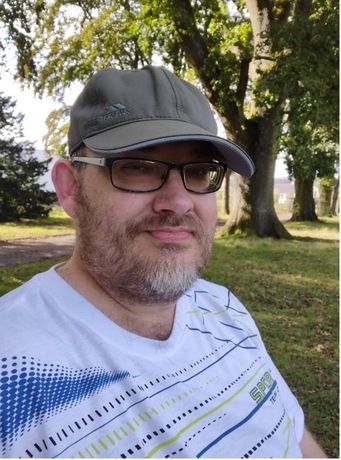Personal Stories

Mark, Cardiff
"If I didn’t feel shame, I would leave the house more often than I do and lead a more fulfilling life. I’ve long felt paranoid about being judged while out and about as if people are talking about me as if they know what I live with. The rational side of my mind knows that’s not the case, but it’s not that straightforward.
My house can be a prison as much as a safe haven. I can go days without stepping out of the door to get much-needed exercise, pulling the curtains open to let the light in, not showering, dressing properly, or eating regularly or healthily. I essentially let myself and the house go. However, I know I’m protected from the outside world, where I’ve been mocked and felt incredibly anxious and overwhelmed.
It’s a double-edged sword. They say to feel the fear and do it anyway, but when this has been a long-standing problem, it’s so hard to break. When I go out to do the things I enjoy, such as seeing a band, I feel so much better for it.
My advice to those in a similar situation is to be kind to yourself and work with someone who is prepared to help you through this. It’s not easy, so set achievable targets over time."

Beth, Cardiff
"I first started struggling with my mental health when I went into the world of work. It was so fast-paced, and everyone around me was so confident and sure of themselves, whereas I felt like I wasn't 'tough enough'. My anxiety got increasingly worse leaving me feeling so ashamed of my secret cries in the toilets. The more I tried to hide it, the worse it got and made me physically as well as mentally unwell. The shame prevented me from asking for help, but in the end, it all got too much, and I left the industry I was in, feeling like a failure. After a chat with my GP, I finally pushed past the shame and asked for help from a counsellor. She helped me to see that struggling wasn’t shameful and from there, helped me to build my confidence and a sense of self-worth. Getting past the shame now means I can talk openly about my experiences in the hope of helping others. I even get to support others with their mental health in my current work role which is amazing.
One piece of advice I’d give to anyone feeling shame around their mental health – please don’t. It’s not your fault. Talking to someone can help you shake off the shame that’s lived so comfortably in your mind, like clutter in your home. However, like clutter, it’s not helpful and can keep you trapped. Asking for help is a lifeline and a way out.”

Ismatara, Cardiff
"Shame acts like a constant burden on our shoulders, forcing us to keep our head down rather than acknowledging how we’re feeling or seeking the necessary help. I suffer from insomnia, PTSD and depression that developed from past traumas, leaving me exhausted with negative thoughts and feeling incapable, irritable and isolated. I allowed stigma and shame to prevent me from getting help for my mental health. This led to me developing a painful condition called Fibromyalgia. When this became unbearable, I finally built the courage to seek help. This made me realise I had neglected my mental health due to the fear and experiences of stigma and shame.
I’ve been called anti-social or someone with ‘mental’ issues amongst other things. Being a domestic violence survivor, the one who was always there trying to support others during their difficulties, it was difficult for people within my circle to understand that I, too, can suffer with my mental health. Some of it was due to cultural stigma, societal expectations and general ignorance. I’ve felt shame to admit to a past employer that I was struggling with my mental health. I was overworked, attempting to compensate out of fear that I would be seen as an incompetent employee. As a Muslim, I’m reminded that Islam promotes looking after our mental health as well as our physical health, giving me the reassurance I needed without any shame or fear of being judged. The first steps in tackling shame are to have no preconceptions, be understanding and supportive and communicate in a safe space."

Richard, Abergavenny
"Why do I feel no one will give me a chance because of my mental health? I was well into my adult years before I realised that my childhood ADHD had, in part, been masking my mental health issues. This hadn’t been helped by the fact that back then ADHD wasn’t universally known. My parents were told I had some kind of hyperactivity disorder and that they should cut my sugar intake.
Even though I feel that I outgrew ADHD during my teenage years, the psychological tricks I had learnt to mask my condition stayed with me. Whereas some areas of my adult life have been somewhat successful, so much of it has been dogged by employers, colleagues, friends, and even family members not understanding how my mental health can affect me. This has always brought with it a certain amount of shame.
In recent years I have been looking for gainful employment, and only once has an application asked if I considered myself neurodivergent. One single company in, quite literally, thousands have openly considered such a condition as a positive. Please let that sink in for a moment.
Over the last few months, I have been considering launching a venture that will hopefully improve social inclusion within my local community. I mention this because it is important to never give up, to never stop trying, and to never feel you cannot talk about your mental health or help others in the process."
Ali, Cardiff
"The concept of mental health is not something that has always been received well in the South Asian community. So, when I first began to struggle with my mental health due to the environment I was living in, it was difficult for me to explain to people the emotional, mental and physical challenges that I was trying to deal with. Loneliness became a regular feeling even though from the outside, there were people around me. Many of the people may have had good intentions, but due to their cultural beliefs surrounding me, they did not want to talk about the importance of mental health. There has always been an overriding sense of shame both from within and outside the community. Shame hangs over people in the community like the stench of a rotten corpse.
People can only overcome this barrier if they start to communicate with each other and share their stories. This doesn’t have to mean broadcasting one’s ills to the entire community. What it does mean is to try to find a safe space so that people who want to talk about their challenges can do so without fear of reprisals or finger-pointing."
